Audi Q7 VS Renault Trafic Transporter
Audi Q7
The Audi Q7 combines luxurious comfort with impressive versatility, making it a standout choice in the SUV market. Its sophisticated design and meticulous attention to detail create an elegant yet robust presence on the road. With advanced technology and a focus on safety, the Q7 ensures a premium driving experience for both the driver and passengers.
more informationRenault Trafic Transporter
The Renault Trafic Transporter is a versatile vehicle known for its spacious interior and functional design, ideal for both business and personal use. Its stylish exterior combined with practical features offers a perfect balance between form and function, making it a popular choice among van enthusiasts. The driving experience is enhanced by its smooth handling and advanced technology, providing comfort and convenience for any journey.
more information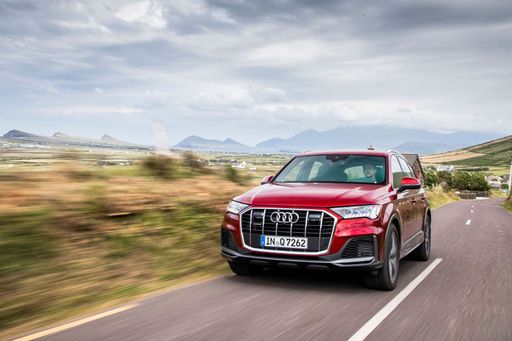 @ audi-mediacenter.com
@ audi-mediacenter.com
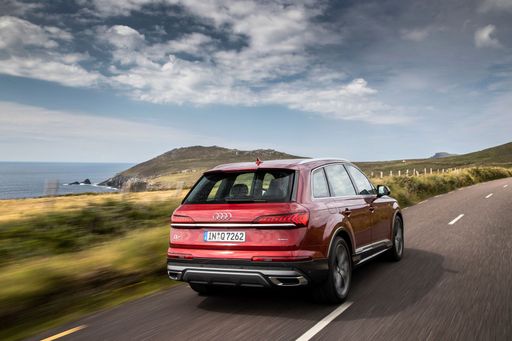 @ audi-mediacenter.com
@ audi-mediacenter.com
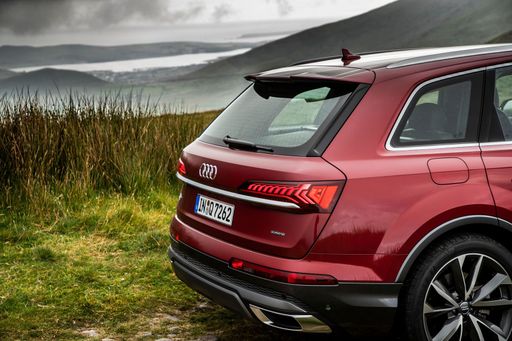 @ audi-mediacenter.com
@ audi-mediacenter.com
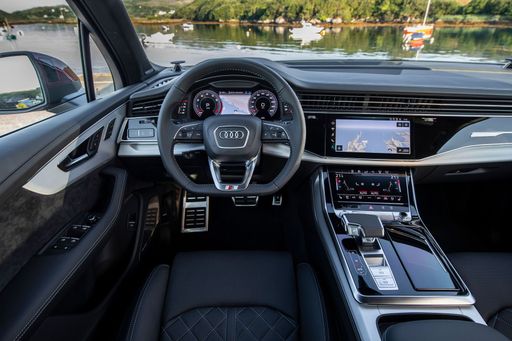 @ audi-mediacenter.com
@ audi-mediacenter.com
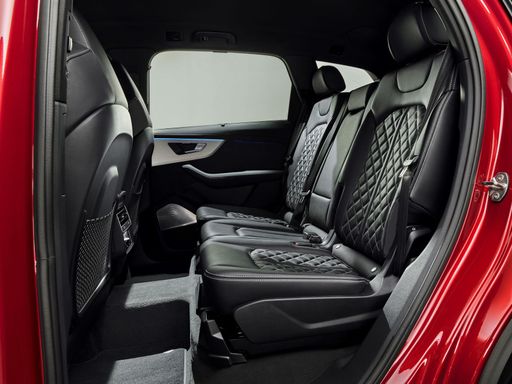 @ audi-mediacenter.com
@ audi-mediacenter.com
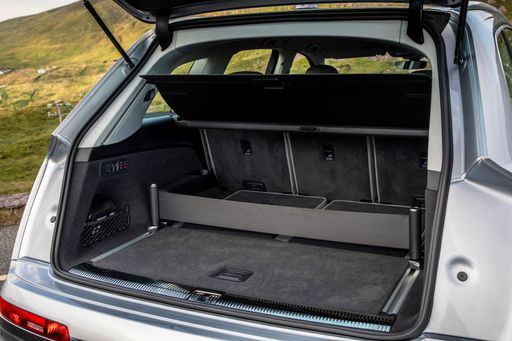 @ audi-mediacenter.com
@ audi-mediacenter.com
Costs and Consumption |
|
|---|---|
|
Price
about 68000 - 97300
£
|
Price
about 29800 - 52500
£
|
|
Consumption L/100km
1.2 - 12
L
|
Consumption L/100km
6.7 - 7.8
L
|
|
Consumption kWh/100km
-
|
Consumption kWh/100km
21.3 - 21.5
kWh
|
|
Electric Range
83 - 84
km
|
Electric Range
289 - 292
km
|
|
Battery Capacity
22
kWh
|
Battery Capacity
-
|
|
co2
28 - 272
g/km
|
co2
178, 176, 181, 183, 180, 184, 182, 185, 187, 177, 179, 202, 205, 0
g/km
|
|
Fuel tank capacity
75 - 85
L
|
Fuel tank capacity
80
L
|
Dimensions and Body |
|
|
Body Type
SUV
|
Body Type
Cargo Van
|
|
Seats
5 - 7
|
Seats
2 - 6
|
|
Doors
5
|
Doors
3 - 4
|
|
Curb weight
2055 - 2460
kg
|
Curb weight
1860 - 2065
kg
|
|
Trunk capacity
563 - 887
L
|
Trunk capacity
-
|
|
Length
5072
mm
|
Length
5080 - 5480
mm
|
|
Width
1970
mm
|
Width
1956
mm
|
|
Height
1703 - 1735
mm
|
Height
1967 - 2509
mm
|
|
Payload
640 - 885
kg
|
Payload
867 - 1185
kg
|
Engine and Performance |
|
|
Engine Type
Diesel MHEV, Plugin Hybrid, Petrol MHEV, Petrol
|
Engine Type
Diesel, Electric
|
|
Transmission
Automatic
|
Transmission
Manuel, Automatic
|
|
Transmission Detail
Automatic Gearbox
|
Transmission Detail
Manual Gearbox, Automat. Schaltgetriebe (Doppelkupplung), Reduction Gearbox
|
|
Drive Type
All-Wheel Drive
|
Drive Type
Front-Wheel Drive
|
|
Power HP
231 - 507
HP
|
Power HP
110 - 170
HP
|
|
Acceleration 0-100km/h
4.1 - 7.1
s
|
Acceleration 0-100km/h
10 - 15.1
s
|
|
Max Speed
226 - 250
km/h
|
Max Speed
110 - 185
km/h
|
|
Torque
500 - 770
Nm
|
Torque
245 - 380
Nm
|
|
Number of Cylinders
6 - 8
|
Number of Cylinders
4
|
|
Power kW
170 - 373
kW
|
Power kW
81 - 125
kW
|
|
Engine capacity
2967 - 3996
cm3
|
Engine capacity
1997
cm3
|
|
Top speed
226 - 250
km/h
|
Top speed
110 - 185
km/h
|
General |
|
|
Model Year
2024
|
Model Year
2022 - 2023
|
|
CO2 Efficiency Class
G, B
|
CO2 Efficiency Class
G, A
|
|
Brand
Audi
|
Brand
Renault
|
Audi Q7
Audi Q7: A Benchmark in Automotive Excellence
The Audi Q7 continues to hold its ground as a versatile and luxurious SUV, offering a rich blend of cutting-edge technology, impressive performance, and comfort. With its recent facelift, the Q7 introduces innovative elements that cater to modern-day driving demands. Explore the technical details and unique attributes that make the Audi Q7 a class leader.
Engine Options and Performance
The Audi Q7 is available with a range of engine options designed to suit various needs and preferences. These include Diesel Mild-Hybrid, Plug-in Hybrid, and Petrol Mild-Hybrid configurations. The power output for these engines ranges from 231 to an exhilarating 507 PS, catering to both efficiency seekers and performance enthusiasts. The Audi Q7 can accelerate from 0 to 100 km/h in as little as 4.1 seconds, showcasing its athletic performance.
Innovative Technology Integration
The Audi Q7 integrates the latest technological advancements to enhance the driving experience. The intuitive Audi Virtual Cockpit and a comprehensive infotainment system ensure that the driver remains informed and entertained. The vehicle’s mild-hybrid systems significantly improve fuel efficiency and reduce emissions, highlighting Audi’s commitment to sustainability without sacrificing performance.
Advanced Safety and Driver Assistance
The Q7 is equipped with state-of-the-art safety features and driver assistance systems to ensure peace of mind on the road. Audi Pre Sense, adaptive cruise control, lane-keeping assist, and a 360-degree camera system work seamlessly together to help prevent accidents and enhance the driving experience.
Design and Interior Comfort
With its bold, sophisticated design, the Audi Q7 is both robust and stylish. The SUV offers configurations for five to seven seats, making it adaptable for families and groups. Meticulously crafted materials, adjustable seating, and advanced climate control systems provide a comfortable environment, even on long journeys.
Environmental Efficiency
The Audi Q7’s environmentally conscious engineering includes models with CO2 emissions as low as 28 g/km. For those opting for the Plug-in Hybrid variant, an impressive electric range of up to 84 km ensures emission-free mobility for daily commutes, reinforcing Audi's commitment to a sustainable future.
Conclusion
The Audi Q7 embodies a sophisticated blend of power, technology, and luxury, making it a standout in its class. Whether you’re looking for a spacious family vehicle, a tech-savvy companion, or a robust performance SUV, the Q7 delivers at every front, proving why it remains a popular choice for discerning drivers.
Renault Trafic Transporter
The Renault Trafic Transporter: A Modern Workhorse Unveiled
Renault has consistently set benchmarks in the world of commercial vehicles, and the Renault Trafic Transporter stands as a testament to its innovation and engineering prowess. With a robust design and a variety of configurations, this model addresses the diverse needs of modern businesses. Let’s delve into the technical details and innovative features that make the Renault Trafic Transporter a standout choice in its segment.
Power and Performance
The Renault Trafic Transporter is powered by a choice of 2.0-litre diesel engines boasting power outputs ranging from 110 to 170 PS (81 to 125 kW). The torque delivery is impressive, with figures ranging from 245 to 380 Nm, ensuring ample pulling power for heavy loads. For those seeking an environmentally friendlier option, Renault offers the Trafic with a 100% electric motor delivering 122 PS, a noteworthy addition to its line-up.
Efficient Fuel Consumption
When it comes to fuel efficiency, the diesel variants of the Renault Trafic maintain a commendable consumption range of 6.7 to 7.8 litres per 100 km. Meanwhile, the electric model showcases a consumption of 21.3 kWh per 100 km, with an electric range that stretches up to 292 km. This efficiency places it favourably within the CO2 efficiency classes from A to G.
Robust and Versatile Design
Versatility is at the heart of the Renault Trafic Transporter’s design ethos. With a wide range of body styles available, including options for an extended height or length, businesses can tailor the vehicle to meet their specific transport requirements. The vehicle offers configurations supporting 3 to 4 doors and a payload capacity that ranges from 867 to 1185 kg, ensuring adaptability to a broad spectrum of logistical challenges.
Advanced Features and Innovation
Inside, the Renault Trafic Transporter features a driver-focused cockpit, equipped with modern conveniences such as a multifunction steering wheel and an intuitive dashboard. The available Ecoline, Komfort, and Komfort EDC equipment lines offer varying levels of comfort and technology, ensuring a fit for every budget and preference.
Safety and Connectivity
Renault has prioritised safety in the Trafic Transporter, equipping it with advanced driver assistance systems and connectivity features to keep drivers connected and secure on the road. These innovations not only enhance the driving experience but also contribute to safer business operations.
Conclusion: A Smart Investment for Businesses
With its variety in configurations, impressive powertrains, and focus on efficiency, the Renault Trafic Transporter emerges as a leading choice for businesses nationwide. Whether navigating urban deliveries or long-distance hauls, this transporter provides the reliability and customization that modern enterprises demand, making it an investment well worth considering.
